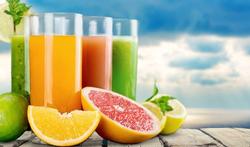Who doesn't like a nice glass of fresh fruit juice? A sweet taste, a vibrant colour and healthy. But according to some dietitians, this is a hasty conclusion: some brands/types of fruit juice do indeed contain useful nutrients, but others are hardly better than liquid candy!
So it's important that you know what you're buying...
Fresh vegetable juice is the best choice
Tomatoes (juice) contains lycopene which can help to reduce the risk of prostate cancer and beetroot juice can help you tame your blood pressure. Vegetable juice with pulp contains some fiber (not as much as the uncentrifuged vegetables) and those are good hunger suppressors. And vegetable juice also contains much less sugar and calories than the typical fruit juices. Do not forget to Check out the salt content of the product.
Fruit cocktails are the worst choice
Be wary of products called fruit cocktail or fruit drink because they usually contain little real fruit juice. They consist mainly of water to which a sweetener such as corn syrup has been added. In terms of nutritional value, they are no better than most soft drinks: lots of sugar and calories, but few nutrients.
The dilemma with 100% fruit
Fruit juice to which no sweeteners have been added, pure juice, is indeed a good source of nutrients such as potassium and vitamin C, but fruit juice is also an extra source of fruit sugar and calories. So not too much ... And juice also doesn't have as much fiber and phytonutrients as the unpressed fruit. So be careful in terms of quantities, most food experts keep it at maximum a glass of pure fruit juice per day. If you like to drink a few extra glasses, then add water to the fruit juice.
If you can drink only one glass of fruit juice a day, choose the right species that contains the most valuable nutrients. Good choices include juice of pomegranate, cranberries, açai berries, plums and red grapes.
- Pomegranate juice is in the lead. It does contain a lot of sugar and calories, but it's also packed with antioxidants. More so than green tea.
- Cranberry juice is a bomb of vitamin C, which is an important tool for your immune system, and it would also help eliminate bacteria that cause urinary tract infections.
- Açai is a berry that grows in South America and the açaiberry juice is a still more or less hype at the moment. Açaipulp contains higher concentrations of antioxidants than cranberries, blueberries, blackcurrants or strawberries.
- It is often said that moderate wine use is good for the heart. Well, the same goes for blue grape juice. It contains flavonoids and resveratrol when pressed from the entire grape: the seeds and peel included. The unpressed fruit already contains more fibres.
- Plum juice is known as an excellent tool for constipation. It is not only a good source of fibre, it also contains a natural laxative namely sorbitol. But it doesn't stop there. Plum juice is also packed with iron, potassium and antioxidants.
- What about orange juice? Orange contains a lot of vitamin C, that's the good news. Some prepackaged juices are also enriched with calcium and vitamin D, which is good for your bones. Unsweetened orange juice has fewer calories than some berry and grape juices, but the other side of the coin is that it also has fewer antioxidants than the dark juices such as grape juice, pomegranate juice and blueberry juice.




